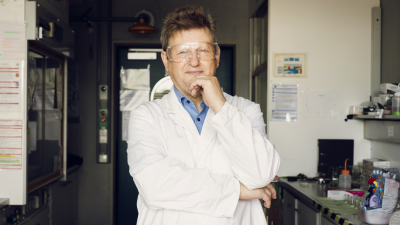ProLOEWE faces
Professor Dr Wolfgang Ensinger Ion-conducting nanopores modelled on nature

Professor Ensinger, you originally came from Heidelberg, where you studied chemistry on a very traditional course. You were appointed as a materials scientist at the Technical University of Darmstadt in 2005 and you have been the spokesperson for the LOEWE iNAPO (Ion-conducting nanopores) cluster together with Professor Bodo Laube and Professor Gerhard Thiel since 2016. What is the cluster all about and how did you hit on the idea of applying for LOEWE funding? That is correct, I received my training as a traditional chemist. However, it also included many aspects of chemical methods that are used in materials science; I have always been particularly interested in them because of the many different opportunities for using them. My move to the Technical University of Darmstadt in 2005, where I have been working as a materials scientist ever since, not only brought me in contact with biologists, but also electrical engineers – and that was a combination that did not exist at the universities where I had been prior to this. Working together, we realised that it is possible to ideally combine the opportunities that are provided by our three faculties and that if we combined electro-chemical sensor technology (materials science) with biological nanopores (biology) and micro-nano integration (electrical engineering), we would be able to produce microsensors that have never been made in the past. This is because these innovative sensors simulate the functions of nanopores in biological cells in a technical environment that uses plastics – and this has never been achieved before. The ion-conducting nanopores are integrated in miniature measuring devices and therefore create a new generation of (bio)molecular sensors.
What have you been able to achieve in the four years of LOEWE funding that would not have been possible without LOEWE, and what will happen after LOEWE? Without LOEWE funding, it would have been impossible to achieve the considerable progress that we have made during this time. The enormous interdisciplinary work performed together by biologists, chemists, materials scientists, physicists and electrical engineers with 15 PhD students has enabled us to advance our knowledge to a huge degree. After the LOEWE funding in Hesse, the consortium is now seeking federal funds, particularly in the form of a Collaborative Research Centre at the DFG (German Research Foundation).
In addition to interdisciplinary cooperation, which you highlight as one of the positive features that LOEWE particularly supports, the scheme also boosts international cooperation. Can you give us some examples of this? Yes, this is another development that has taken place within the project. Each of the sub-project leaders is engaged in international cooperation and – in our case – iNAPO ideas have been picked up and enhanced; this international component ranges from working with colleagues in the USA to numerous European cooperation arrangements and even working with the Far East. I would like to mention one example that may sound rather exotic – the NanoPur project, where DAAD (German Academic Exchange Service) funding is available to try to give colleagues in Pakistan the opportunity of developing a miniature sensor; this would enable people in rural areas to test the water that they take from polluted rivers for drinking to see whether it contains any pollutants; it could therefore save human lives.
Even if you are passionate about your work and have probably turned your hobby into your means of earning a living, how do you create some sense of balance in your private life? I admit that this is a difficult topic. Whether a person who has turned their work into their hobby or vice versa is someone to envy or feel sorry for, remains to be seen. In my case, where I do not have as much time left for my family as I probably should, we have turned it into a joint hobby.
My sons, who still go to school, cook with me in Dad‘s culinary school at midday on Sundays; my wife looks on in a favourable way. And when I visit my grown-up daughters, we do what we call modern co-cooking, i.e. cooking together. I am just getting to know the finer points of vegan cooking, for example, at the moment. It is creative and you realise what you have created. That is wonderful and I recommend it to everyone.
About the Person
- Spokesman of the LOEWE cluster iNAPO

